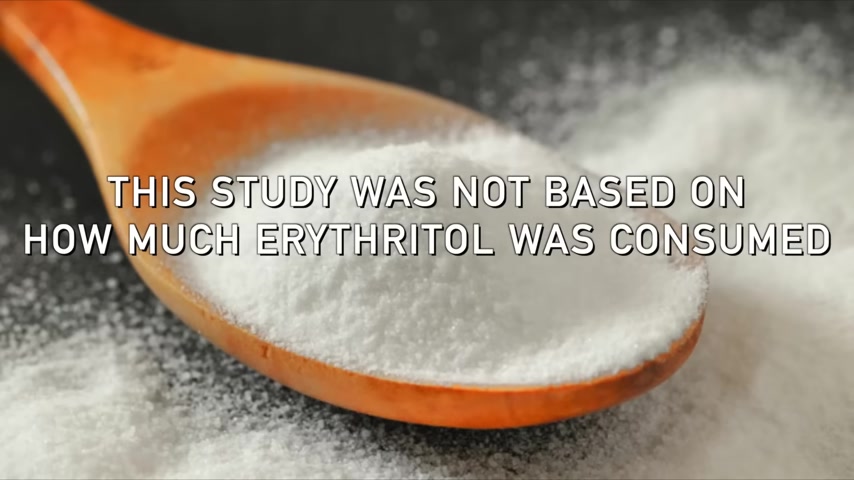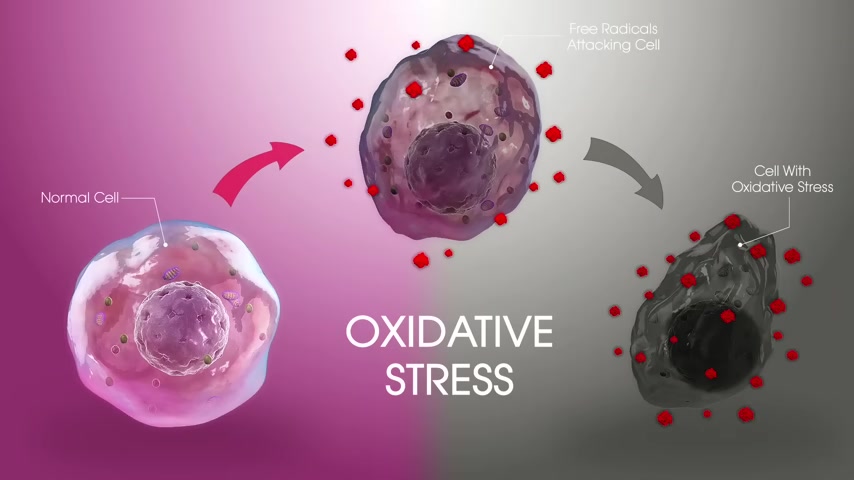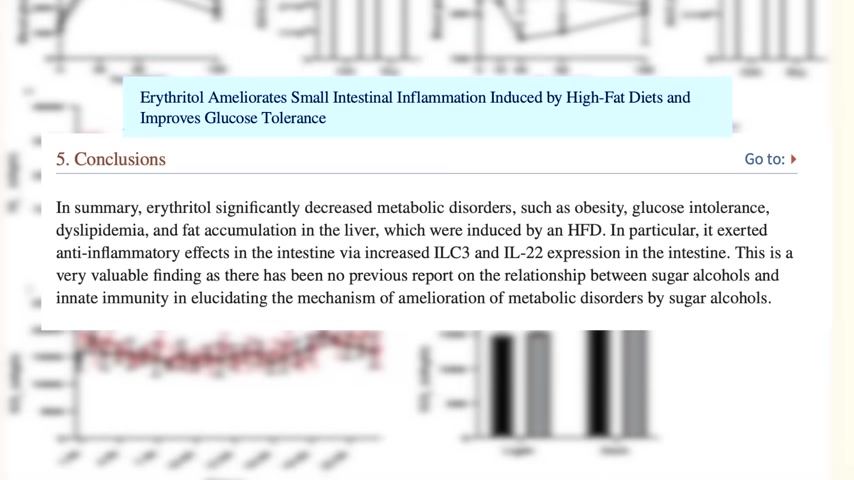
https://www.youtube.com/watch?v=0oPkpa3ovSo
Erythritol Linked to Heart Attacks and Strokes, Really

Oh , man .
Now erythritol is causing heart attacks and strokes .
Now I'm gonna have to change all my videos .
I've been promoting erythritol for years .
Now I gotta redo all these darn videos .
Darn it .
Alright .
On a serious note , I'm just being sarcastic .
Okay ?
Let's talk about this , fascinating study that was just released .
It's all over the news .
It's all over social media that erythritol in your blood is now correlated to higher incidence of heart attacks and strokes .
Now when I see something like this all over the news , right , just out of the blue , I wanna know the source of the study , the who's funding the study , and I'm gonna put some links down below on that topic .
And if you actually read the study , there are some really interesting , not just red flags , but serious omissions .
Okay .
And I wanna talk about them .
There's actually 4 points about the study .
I'm gonna make it really simple .
I'm not gonna get into the nitty gritty of all the details of the study , but I wanna talk about the 4 big problems with the study .

The first 1 involves this word called correlation .
Correlation refers to something that has a similar association , usually some measurement or number .
It has nothing to do with causation .
So let me just kind of give you an example of correlation .
Statistically , there's a correlation of 99 point 79% of government spending on science and space technology in the state of Maine , and the number of suicides from hangings .
So if you were to look at that from a causation , you would wanna dramatically reduce the amount of spending in the schools on this technology .
Right ?
I mean , that's totally illogical .
Let's look at another 1 .

There's a 94.7% correlation between cheese consumption in the United States per person in pounds and people dying from being tangled in bedsheets .
So in other words , there's a correlated statistical increase between so many years .
And this also correlates between the total amount of revenue generated by skiing facilities in the US .
So you can see these disrelated things have a very similar correlation .
Personally , I think there's a very high statistical correlation , like it's probably close to a 100% of information being put out by the news and it being completely false .
So point 1 correlation doesn't mean causation .
This was an observational study , not a very high quality study .
Alright .


Number 2 , this study was not based on how much erythritol was consumed by people .
It did not measure dietary erythritol at all .
That was not measured in this main study .
What was measured was just the amount of erythritol in the blood that could have come from your body making it .
Our bodies actually make erythritol .
It's called endogenous erythritol .
And chances are erythritol is not really that popular .
So this study could basically be just measuring endogenous erythritol , which is the erythritol made by your own body .
Now the 3rd point I wanna bring up will explain number 2 .
Why would your body actually make erythritol in the first place ?
Why would it make high amounts ?
Well , erythritol is produced when you metabolize glucose .
Okay ?
So the more sugar you consume , the more you're a diabetic .

The more fructose you consume , the more erythritol you're gonna make .
Erythritol is also made when there's oxidative stress in the body .
And so it's made when you have liver disease , kidney disease , diabetes .
It also is increased when you have belly fat , which is correlated probably from the amount of carbs you consume .
It's also produced when you consume a lot of alcohol .
So that's an interesting piece of information .
So how can we really know if these cardiovascular , events are caused by the erythritol or by the person's overall health .
And the other thing you should know about this study , the great majority of the people in this study had high blood pressure , had diabetes .
They were in very , very poor health .
Just something you should know .
And number 4 , okay , and this is the icing on the cake .
If you look up research on Erythritol , okay , you're gonna find some really interesting counter information .

Erythritol apparently is an antioxidant .
It has anti inflammatory properties .
It has the potential to lower A1C , blood glucose , improve insulin resistance .
It has the ability to increase insulin sensitivity , It apparently in 1 study show that it improved endothelial function and can decrease the aortic stiffness and apparently can even slow down weight gain in my studies that were fed a high fat diet .
That's very interesting .
Could it possibly be that erythritol is increasing to counter the bad effects of sugar creating oxidative stress and lowering inflammation .
Is that a possibility ?
So , apparently , if you align all of this data together , it sounds to me that it's definitely more likely something that's trying to help you than something that's trying to hurt you .


So , you know , honestly , I just I don't like doing these videos because it's kind of a reaction to something in the news , which is kind of a distraction from other topics that I really want to talk about , on a daily basis in my videos .
But I just wanted to give you a summary on this , so you have all the information .
So you personally can make up your own mind on whether , erythritol is is the bad guy or possibly even the good guy .
Now check this part out .
This is extracted from the conclusion of 1 of the studies talking about erythritol .
It says this , in summary , erythritol significantly decrease metabolic disorders such as obesity , glucose intolerance , dyslipidemia , which is a kind of a dysfunction of your lipids and fats , and fat accumulation in the liver , which were induced by a high fat diet .
In particular , it exerted anti inflammatory effects in the intestine .

Yes .
This study was done in mice , but still it showed that there's actually a benefit of taking Erythritol .
Now since we're sort of on the topic of cardiovascular events , if you really want to know what can support your heart , you should check this video out right here .
Are you looking for a way to reach a wider audience and get more views on your videos?
Our innovative video to text transcribing service can help you do just that.
We provide accurate transcriptions of your videos along with visual content that will help you attract new viewers and keep them engaged. Plus, our data analytics and ad campaign tools can help you monetize your content and maximize your revenue.
Let's partner up and take your video content to the next level!
Contact us today to learn more.